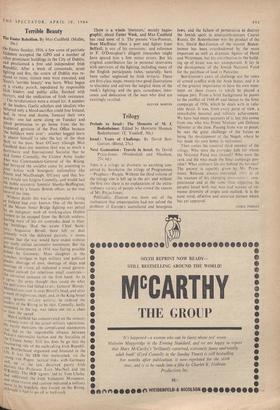Terrible Beauty
ON Easter Sunday, 1916, a few score of patriotic Irishmen occupied the GPO and a number of other prominent buildings in the City of Dublin, and proclaimed a free and independent Irish Republic. After a week of cannonade, street fighting and fire, the centre of Dublin was re- duced to ruins, sixteen men were executed, and Yeats's 'terrible beauty' was born. What began as a cranky putsch, repudiated by responsible Irish leaders and public alike, finished with Martyrs, and the unification of Irish resistance.
The revolutionists were a mixed lot. A number of the leaders, Gaelic scholars and idealists who believed only a blood-sacrifice could free Ireland, had, in verse and drama, forecast their own deaths: one lad came along on Tuesday and asked permission to go home from the be- leaguered garrison of the Post Office because the holidays were over': another begged leave to absent himself to take the key of the shop back to his boss. Sean O'Casey (though Max Caulfield does not mention this) was so much a doctrinaire and International Socialist that he said James Connolly, the Citizen Army leader who was Commandant-General of the Rising, had betrayed the socialist cause by, assenting to Joint action with bourgeois nationalists like "arse, and MacDonagh. O'Casey said that his- tory would not forgive Connolly, and would hail - the noble eccentric feminist Sheehy-Skeffington, murdered by a lunatic British officer, as the true hero of the time. Without doubt this was-as unpopular a rising as Ireland had ever known. One of the heroes "f the Mount Street Bridge fighting was pelted by an indignant mob of working-class Dublin Women as he escaped from the British soldiers, leaving most of his six comrades dead in blaz- ing buildings. Had the astute Chief Secre- tary, Augustine Birrell, been left to deal leniently with the defeated patriots, it seems certain that the war would have ended without anY really united nationalist movement. But the British Government in 1916 was facing possible defeat by Germany. Mass slaughter in the trenche,s, intrigue in high military and political Places, shortage of men, shortage of ships and Shortage of vision, all indicated a usual govern- mental cure-all for rebellious small countries— the universal panacea of the firm hand. As in YPrus, the army thought they could do what the politicians had failed to do: General 'Bloody' Maxwell was sent in over Birrell's head, and after a week of inglorious, inept, and. in the King Street area, ignoble military activity, he ordered the "eaders of the Rising to be shot. Connolly, badly wounded in the leg. was taken out on a chair 10 face the squad. Max Caulfield has concentrated on the minute, t"-minute story of the actual military operations. ,hesharely mentions the complicated manoeuvres p a' led to the improbable alliance between the nationalist faction and the Socialists of trne Citizen Army. Still less does he go into the c4,seinating role of the oath-taking Irish Republi- can Brotherhood organised and financed in the 't was the IRB that maintained, via the .4"n‘iung von Papen, tactical links with. Germany p up 10 the last, deceived purely Irish (galls like Professor Eoin MacNeil and the had ahillY. the IRB 'agents.' led by Tom Clarke, and infiltrated the Irish Volunteer MoVement,
when reason and caution indicated.a military Mov alit e to be hopeless, they forced on the Rising. 2nueh it had In io off at 'half-cock
There is a whole 'literature,' mainly hagio- graphic, about Easter Week, and Max Caulfield has read most of it. The present Vice-Premier, Sean MacEntee (then a poet and fighter from Belfast), is one of his omissions: and reference to F. O'Donoghue's diligent researches might have spared him a few minor errors. But his original contribution lies in personal interviews with survivors of the fighting, including many of the English participants (who, naturally, have been rather neglected by Irish writers). There are first-class maps; twenty-two good illustrations to elucidate and enliven the tangled skein of the week's fighting; and the guts. cussedness, inno- cence and dedication of the men who died are excitingly recalled.
OLIVER MARTIN






































 Previous page
Previous page